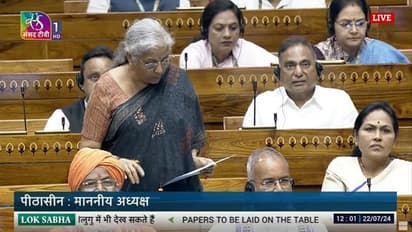Economic Survey 2023-24: Mental health challenges demand paradigm shift in policy and community approach

Synopsis
Drawing on data from the National Mental Health Survey (NMHS) 2015-16, the report revealed that 10.6% of adults in India suffer from mental disorders, with a treatment gap ranging between 70% and 92% for various disorders.
The Economic Survey, tabled by Union Finance Minister Nirmala Sitharaman on Monday (July 22), highlighted a concerning rise in mental health issues among Indians, urging a fundamental shift towards a bottom-up, whole-of-community approach to tackle the problem. The survey stressed the dual importance of addressing mental health both as a health concern and an economic imperative. It stressed that mental health issues have a broader impact on productivity compared to physical health problems.
Drawing on data from the National Mental Health Survey (NMHS) 2015-16, the report revealed that 10.6% of adults in India suffer from mental disorders, with a treatment gap ranging between 70% and 92% for various disorders. The prevalence of mental morbidity was found to be higher in urban metro regions (13.5%) compared to rural areas (6.9%) and urban non-metro areas (4.3%).
India's real GDP projected to grow 6.5% to 7% in 2024-25, Economic Survey reveals | Key highlights
"Individuals aged 25-44 years are the most affected by mental illnesses," referencing ongoing studies and recent data by Dhyani et al. (2022). Additionally, the National Council of Educational Research and Training (NCERT) survey highlighted a significant rise in mental health issues among adolescents, exacerbated by the COVID-19 pandemic. The survey found that 11% of students felt anxious, 14% experienced extreme emotions, and 43% had mood swings, with academic pressures being a major source of anxiety.
The Economic Survey pointed out that mental health disorders lead to substantial productivity losses due to absenteeism, decreased productivity, disability, and increased healthcare costs. It stressed the importance of acknowledging mental health as a crucial aspect of overall well-being in policy development.
While India has made strides in policy design, the survey noted gaps in implementation that hinder the effectiveness of mental health programs. It called for increased awareness and efforts to reduce the stigma surrounding mental health, which often prevents individuals from seeking help.
The report recommended a paradigm shift towards a community-based approach to mental health, emphasizing early intervention, positive language in schools, and community-level interactions. It also highlighted the need to balance the role of technology, noting that overuse of the internet and social media can exacerbate mental health issues among children and adolescents.
Parliament debate intensifies as Rahul Gandhi questions NEET 2024 paper leak claims; check details
Stay updated with the Breaking News Today and Latest News from across India and around the world. Get real-time updates, in-depth analysis, and comprehensive coverage of India News, World News, Indian Defence News, Kerala News, and Karnataka News. From politics to current affairs, follow every major story as it unfolds. Get real-time updates from IMD on major cities weather forecasts, including Rain alerts, Cyclone warnings, and temperature trends. Download the Asianet News Official App from the Android Play Store and iPhone App Store for accurate and timely news updates anytime, anywhere.